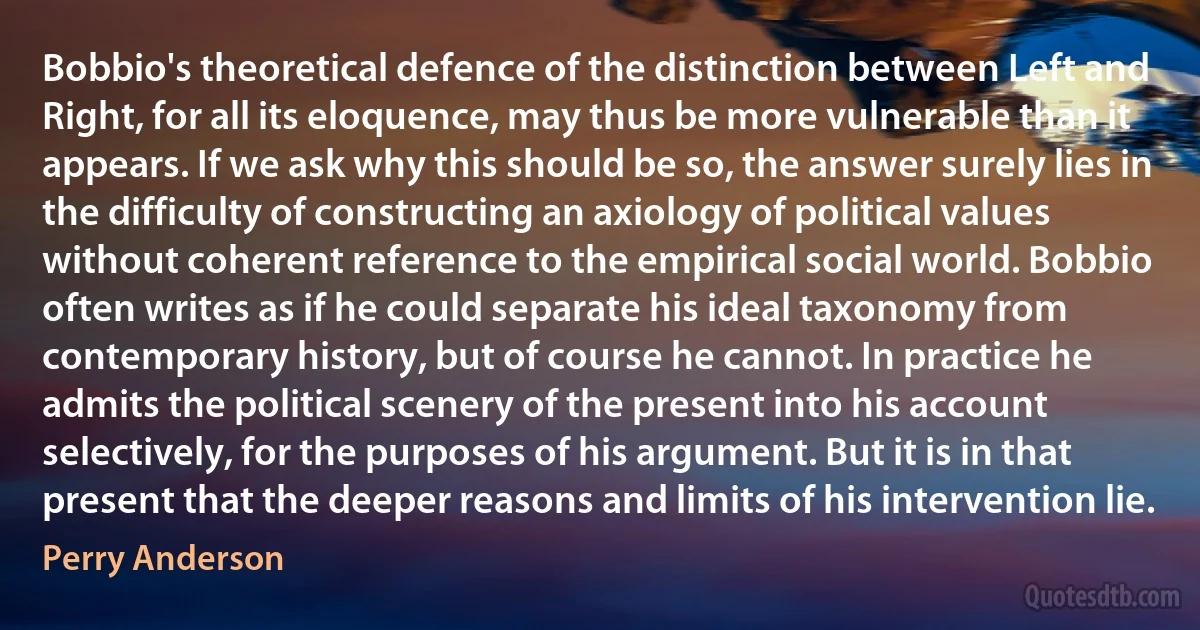
Bobbio's theoretical defence of the distinction between Left and Right, for all its eloquence, may thus be more vulnerable than it appears. If we ask why this should be so, the answer surely lies in the difficulty of constructing an axiology of political values without coherent reference to the empirical social world. Bobbio often writes as if he could separate his ideal taxonomy from contemporary history, but of course he cannot. In practice he admits the political scenery of the present into his account selectively, for the purposes of his argument. But it is in that present that the deeper reasons and limits of his intervention lie.
Perry AndersonRelated topics
account answer argument ask constructing contemporary course difficulty history intervention left lie practice present right scenery should taxonomy thus world liesRelated quotes
Here at present I felt afresh-for I had felt it again and again-how my equilibrium depended on the success of my rigid will, the will to shut my eyes as tight as possible to the truth that what I had to deal with was, revoltingly, against nature. I could only get on at all by taking "nature" into my confidence and my account, by treating my monstrous ordeal as a push in a direction unusual, of course, and unpleasant, but demanding, after all, for a fair front, only another turn of the screw of ordinary human virtue. No attempt, nonetheless, could well require more tact than just this attempt to supply, one's self, all the nature.

Henry James
This ideal University of Life ... would never take the importance of culture for granted. It would know that culture is kept alive by a constant respectful questioning-not by an excessive and snobbish attitude of respect. Therefore, rather than leaving it hanging why one was reading Anna Karenina or Madame Bovary, an ideal course covering nineteenth-century literature would ask plainly "What is it that adultery ruins in a marriage?” Students in the ideal University of Life would end up knowing much the same material as their colleagues in other institutions, they would simply have learned it under a very different set of headings.

Alain de Botton
The express pulled into the Stazione Termini in Rome five minutes ahead of schedule with a feminine shriek. Ruiz found a porter with no difficulty, tipped him the standard 100 lire for his two pieces of luggage, and gave directions. The priest's Italian was adequate, but hardly standard; it made the facchino grin with delight every time Ruiz opened his mouth. He had learned it by reading, partly in Dante, mostly in opera libretti, and consequently what he lacked in accent he made up for in flowery phrases; he was unable to ask the way to the nearest fruit stall without sounding as though he would throw himself into the Tiber unless he got an answer.

James Blish
Whereas reasons may, and usually do, figure among the proximate causes of belief, and thus play a part in both kinds of series (cognitive and causal), it is always possible to trace back the causal series to a point where every trace of rationality vanishes ; where we are left face to face with conditions of beliefs social, physiological, and physical- which, considered in themselves, are quite a-logical in their character. /.../ on any merely naturalistic hypothesis, the rational elements in the causal series lie always on the surface. Penetrate but a short way down, and they are found no more.

Arthur Balfour
In fact, for a voluntarist like Schopenhauer, a theory so sanely and cautiously empirical and rational as that of Darwin, left out of account the inward force, the essential motive, of evolution. For what is, in effect, the hidden force, the ultimate agent, which impels organisms to perpetuate themselves and to fight for their persistence and propagation? Selection, adaptation, heredity, these are only external conditions. This inner, essential force has been called will on the supposition that there exists also in other beings that which we feel in ourselves as a feeling of will, the impulse to be everything, to be others as well as ourselves yet without ceasing to be what we are.

Miguel de Unamuno
